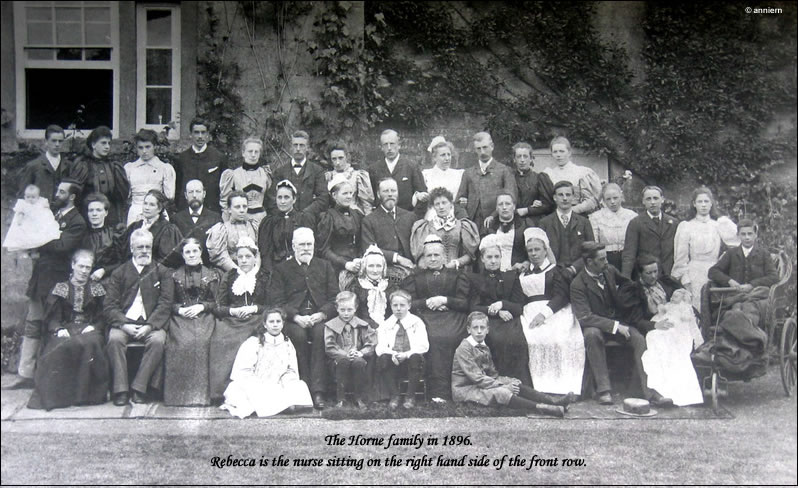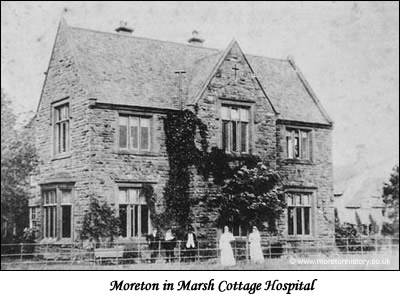One family story that I remember my mother telling me about was that of my grandfather’s aunt, Rebecca Horne. The story, as it was passed down to me, was that she had been engaged to the son of a local lord, Lord Redesdale, who had died in a riding accident just before their marriage. Afterwards he told Rebecca that if she wished to train for a profession, then he would pay for her to do so. My mother was always rather envious of this, as her own parents had been unable to afford to send her to university.
I have not been able to establish the truth of this story, however I do know that Rebecca was born in 1840 in Moreton in Marsh, a bustling Cotswold market town, to Thomas Horne a local corn merchant and his second wife Elizabeth Toms.

The story of how she became a nurse is taken from an account that she wrote to her friend about the founding of Moreton Hospital, which is now held at the record office in Gloucester. In 1870 she was nursing a sick friend, when the local GP, Dr Yelf, visited and praised her nursing skills and said that he wished that there was a cottage where he could send sick people to be nursed by ladies such as her. The next time he visited he told her that he had talked the matter over with the committee of men who managed the dispensary and that they had approved the idea.
Rebecca had followed Florence Nightingale’s exploits in the Crimean War with great excitement and had been envious of an older step-brother, Thomas, who had emigrated to New Zealand, as well as another brother, George, who became a missionary to the Chicasaw Indians in Oklahoma, USA. Now she saw her own chance for adventure. She recounts that with very little hesitation she wrote to several hospitals asking how she might get some training. The matron of St Thomas’ Hospital in London suggested that she join a group of nurses training with the Nightingale Trust. Rebecca duly applied and was accepted.
Florence Nightingale (1820-1910) founded the world’s first professional school of nursing at St Thomas’ Hospital in 1860, the forerunner of the current Florence Nightingale School of Nursing & Midwifery at King’s College in London.
Born into a wealthy family, she was determined to enter nursing despite the low status of the work at this time. She managed to acquire experience of nursing in Germany and France and ran a nursing home for gentlewomen in Harley Street, London, before embarking for the Crimea with thirty-eight nurses and sisters in 1854. Her major achievement in the Crimea was to organise the barracks hospital at Scutari, introducing proper discipline among the nurses and better sanitation, and became known as ‘the lady of the lamp’. In 1855 a public subscription was launched for her and raised over £50,000 (more than £2.6 million today). Nightingale decided to use this to found a nursing school. The nursing school opened on the 9th July 1860 and she published her famous book Notes on Nursing the same year.

Due to ill-health Nightingale was not able to run the school directly herself, but she oversaw the specification of the nursing school in the new St Thomas’ Hospital building and gave instructions for every aspect of the training. She stipulated that it was to be ward based rather than lectures. She also scrutinised the probationers ward diaries. Successful students were presented with her book and invited to tea at her house. From the beginning, her aim was that Nightingale nurses should go on to found training schools elsewhere in Britain and throughout the world.
Meanwhile, back in Moreton, a committee was set up to raise funds for a cottage hospital. Lord Redesdale gave some land and £150 towards the building costs. This was matched by a public subscription of £666 and £56 from the church collection. The first report in 1872 showed that the hospital building cost £875. The hospital was opened a year later by the Bishop of Gloucester, with seven beds and Rebecca as its first matron.
After her training she was disappointed to discover that her very first patient was an old man with a leg ulcer. He was followed by twenty further patients in the first year and a further thirty-six in 1874, only two of whom she was pleased to note had leg ulcers! In 1878 the hospital received a legacy from a local doctor and they were able to lay the cornerstone for a new building. An operating theatre followed in 1900.
Rebecca never married and remained matron of the hospital until her retirement. She died in 1925.
Acknowledgements
In researching this article I am grateful to Gloucestershire Archives for photocopying Rebecca’s letters.
With thanks to Moreton in Marsh & District Local History Society for permission to reproduce the picture of the cottage hospital.
Information about the Nightingale School for Nursing can be found on The Florence Nightingale Museum’s website.
anniern
© anniern 2009